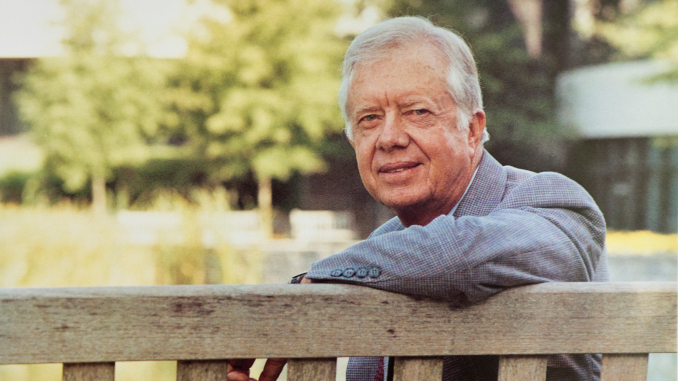
“I have one life and one chance to make it count for something…. My faith demands that I do whatever I can, wherever I can, whenever I can, for as long as I can with whatever I have, to try to make a difference.”
~ Jimmy Carter
Having just achieved centenarian status—the only U.S. president to ever do so—Jimmy Carter (James Earl Carter Jr.) passed away on December 29. Carter served as the 39th President of the United States from 1977 to 1981.
President Carter displayed grit and set the tone for his presidency on his first full day in office, when he fulfilled a controversial campaign promise to pardon Vietnam War draft evaders. Although he received few plaudits over the next four years for his management of various domestic and international crises, presidential historians subsequently have praised his “steadiness, courage, and idealism” while in office. They also cite Carter’s active post-presidential efforts on behalf of human rights and peace as hallmarks of “one of the greatest post-presidencies in United States history.” About his famed hands-on involvement in the organization Habitat for Humanity, Carter described it as part of his commitment to Christian action, stating, “[O]ne of the best ways to practice my faith as a Christian is to participate in Habitat projects every year.”
Though mostly known as a peanut farmer, Carter was in fact a distinguished graduate of the U.S. Naval Academy, followed by seven years of naval service that included sophisticated duties in engineering and electronics repair. In 1953, he was poised to become engineering officer of one of the nation’s first nuclear-powered submarines but chose to return to Georgia when his father died so that he could manage family interests. A decade later, he began serving four years in the Georgia State Senate (1963–1967) and served as Georgia’s governor from 1971 to 1975.
Less flatteringly, Carter was a founding member of the Trilateral Commission formed in 1973 by David Rockefeller and Zbigniew Brzezinski and described his involvement with the elite group as a “splendid experience.” Carter’s presidential running mate, Walter Mondale, was also a Commission member. When Carter became president, “Zbig” became his National Security Advisor and, as described by Patrick Wood in Technocracy Rising, 20 Trilateral Commissioners stepped into top government posts, including the positions of Secretary of State, Defense, and Treasury.
We did not agree with Carter on a number of issues, including in the health care area, but he was very courageous on the Middle East and took a lot of heat. His humanitarian work following his presidency revealed a willingness to brave the scorn of the military-industrial complex and DC politicians and to chart an independent course. In 2002, Carter’s “decades of untiring effort to find peaceful solutions to international conflicts, to advance democracy and human rights, and to promote economic and social development” were rewarded with the Nobel Peace Prize. Carter is the only one of the four U.S. presidents who have won the prize to receive the honor (for which he had been repeatedly nominated) after leaving office.
Related:
Jimmy Carter (Wikipedia)
Jimmy Carter (Miller Center)
Proclamation 4483—Granting pardon for violations of the Selective Service Act
Jimmy Carter, a lifelong Baptist, left a legacy of faithfulness, compassion and justice
views: 341
